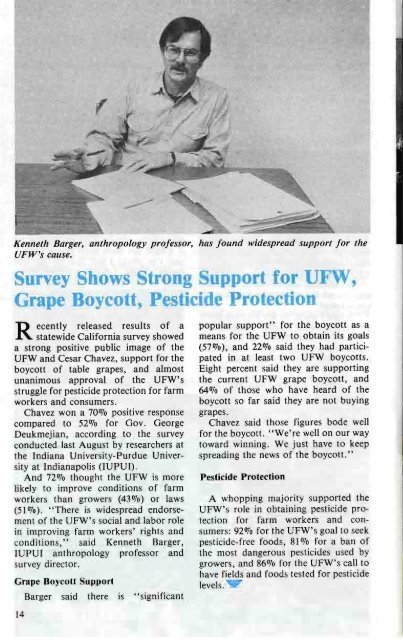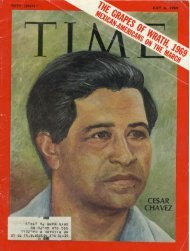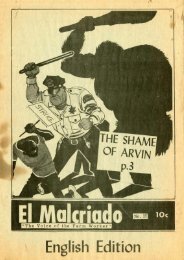You also want an ePaper? Increase the reach of your titles
YUMPU automatically turns print PDFs into web optimized ePapers that Google loves.
Kenneth Barger, anthropology professor, has found widespread support for the<br />
<strong>UFW</strong>'s cause.<br />
Survey Shows Strong Support for <strong>UFW</strong>,<br />
<strong>Grape</strong> <strong>Boycott</strong>, Pesticide Protection<br />
R<br />
ecently released results of a<br />
statewide California survey showed<br />
a strong positive public image of the<br />
<strong>UFW</strong> and Cesar Chavez, support for the<br />
boycott of table grapes, and almost<br />
unanimous approval of the <strong>UFW</strong>'s<br />
struggle for pesticide protection for farm<br />
workers and consumers.<br />
Chavez won a 70070 positive response<br />
compared to 52070 for Gov. George<br />
Deukmejian, according to the survey<br />
conducted last August by researchers at<br />
the Indiana University-Purdue University<br />
at Indianapolis (IUPUI).<br />
And 72% thought the <strong>UFW</strong> is more<br />
likely to improve conditions of farm<br />
workers than growers (43%) or laws<br />
(51 %). "There is widespread endorsement<br />
of the <strong>UFW</strong>'s social and labor role<br />
in improving farm workers' rights and<br />
conditions," said Kenneth Barger,<br />
IUPUI anthropology professor and<br />
survey director.<br />
<strong>Grape</strong> <strong>Boycott</strong> Support<br />
14<br />
Barger said there is "significant<br />
popular support" for the boycott as a<br />
means for the <strong>UFW</strong> to obtain its goals<br />
(57%), and 22% said they had participated<br />
in at least two <strong>UFW</strong> boycotts.<br />
Eight percent said they are supporting<br />
the current <strong>UFW</strong> grape boycott, and<br />
64% of those who have heard of the<br />
boycott so far said they are not buying<br />
grapes.<br />
Chavez said those figures bode well<br />
for the boycott. "We're well on our way<br />
toward winning. We just have to keep<br />
spreading the news of the boycott."<br />
Pesticide Protection<br />
A whopping majority supported the<br />
<strong>UFW</strong>'s role in obtaining pesticide protection<br />
for farm workers and consumers:<br />
92% for the <strong>UFW</strong>'s goal to seek<br />
pesticide-free foods, 81 % for a ban of<br />
the most dangerous pesticides used by<br />
growers, and 86% for the <strong>UFW</strong>'s call to<br />
have fields and foods tested for pesticide<br />
levels.•<br />
Table <strong>Grape</strong> Official Minimizes<br />
<strong>UFW</strong> Pesticide Concerns<br />
W<br />
hen California Table <strong>Grape</strong><br />
Commission President Bruce<br />
Obbink served as moderator for<br />
panelists in San Antonio in October, he<br />
could not have been more insensitive to<br />
the pesticide threat to farm workers and<br />
consumers in his advice to food producers<br />
on how to combat boycotts.<br />
Obbink expoul1ded on his "principle<br />
of magnitude" as the best way to offset<br />
the current <strong>UFW</strong> boycott of table<br />
grapes. "The principle of magnitude,"<br />
he lectured, "is that if there is an issue,<br />
you need to identify an issue that has<br />
greater magnitude." So ridicule the<br />
<strong>UFW</strong> for boycotting only grapes when,<br />
in fact, growers contaminate all fruits<br />
and vegetables with pesticides. In other<br />
words, the principle of magnitude<br />
should be used to seduce the public into<br />
criticizing the <strong>UFW</strong> for not<br />
simultaneously boycotting ALL fruits<br />
and vegetables - instead of blaming<br />
growers for using dangerous pesticides<br />
in the first place!<br />
Obbink felt no need to touch on a<br />
more basic principle - truth. Not a<br />
word about whether the grape boycott<br />
has any merit in the first place. Not a<br />
word about farm workers poisoned .<br />
infants born with birth defects .<br />
children dying of cancer ... consumers<br />
eating pesticide residues. Obbink,<br />
unfazed by facts, saw nothing unprincipled<br />
in advising food producers and<br />
retailers: "your company, right or<br />
wrong."<br />
Outprincipling even Obbink in<br />
callousness was John Meadows of the<br />
Adolph Coors beer company. He<br />
presented four basic principles for<br />
fighting boycotts. Two were "go for the<br />
throat" and "keep a sense of humor."<br />
Most people don't see anything<br />
humorous about pesticide poisoning <br />
no matter how basic the principle is.<br />
Bruce Obbink lectures<br />
growers to ridicule the<br />
union for exposing the<br />
threat ofpesticides.<br />
15





